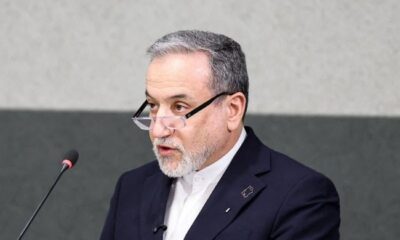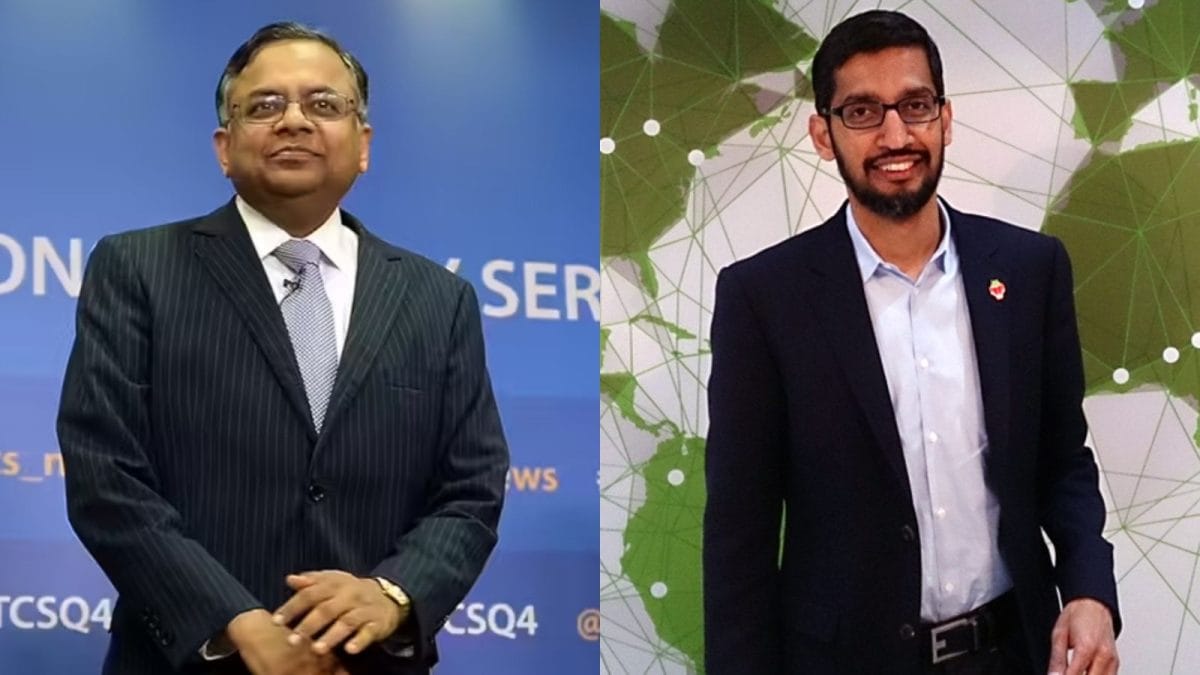Business
Trump’s threats against late-night TV could spell more trouble for advertisers

A sign is displayed outside the El Capitan Entertainment Centre in Hollywood where the “Jimmy Kimmel Live!” show will be recorded on the first night the show will return to the ABC lineup on September 23, 2025 in Los Angeles, California.
Mario Tama | Getty Images
Late-night television has come under fire in recent months. That could leave advertisers and media companies, already clinging to what’s left on live TV, with an even smaller pool of options.
The recent upheaval in late-night programming — namely the cancellation of “The Late Show with Stephen Colbert” and the temporary suspension of “Jimmy Kimmel Live!” — has shown a spotlight on ratings and revenue for late-night standouts and spurred questions of political influence.
President Donald Trump, aggressively vocal about both Colbert’s and Kimmel’s bad fortune, has called for late-night shows on NBC hosted by Jimmy Fallon and Seth Meyers to be next on the chopping block.
The result is not just uncertainty for viewers, TV executives and show staffs, but a pall over an advertising category that’s long been a staple of live TV.
“Reaching a lot of people who are engaged because it’s live TV — or live-to-tape — is really important, and when you think about it from the media company’s perspective … the live moments are live sports on most given nights, the nightly news and late-night talk shows. That’s all you have,” said Kevin Krim, CEO of ad data firm EDO.
“To the people who think late night doesn’t matter, they’re not thinking about the economics and the goals and the incentives of both the advertisers and the media companies. They’re ignoring some of the strategic value of the ecosystem,” he added.
When Disney’s ABC pulled “Jimmy Kimmel Live!” off the air in September, it was unclear for days if or when the program would return. While Disney reinstated Kimmel less than a week later, more than 20% of the country still couldn’t watch the show for three additional days as two major broadcast station owners preempted the content.
Colbert’s show will end next year after CBS parent Paramount announced in July it wouldn’t renew the program, citing financial considerations. The company has yet to reveal plans to fill the timeslot or give it back to the affiliate network owner.
The fervor around Colbert’s upcoming cancellation caused a temporary ratings surge, and Kimmel’s suspension led the show to rake in millions of viewers upon its return — way above the average and a missed opportunity for advertisers in the markets where Kimmel was preempted.
Late-night draw
Traditional TV viewership has decreased as the audience opts for streaming. But live content still garners the biggest ratings, which includes late-night talk shows.
As a result, late-night shows remain a valuable time slot for advertisers, especially for a younger demographic.
“Late-night may not draw the same mass audiences it once did, but the viewers who tune in are highly intentional. For advertisers, that makes the space less about sheer scale and more about reaching a consistent, engaged community,” said Julie Clark, longtime ad industry executive and current senior vice president of media and entertainment at TransUnion.
“Jimmy Kimmel Live!” was considered among the top 10 of ABC’s best vehicles for advertising reach, with the show delivering 2.5% of the network’s total ad exposures, or 11.8 billion national TV impressions, according to ad measurement firm iSpot.
According to EDO, in order to generate as much ad impact as one ad in the late-night comedy broadcast programs — that’s Kimmel, Fallon, Meyers and Colbert — advertisers would need to air, on average, about four spots across competitive late-night programming this year. In this case, competitive late-night programming means everything aired on broadcast and cable TV, excluding the late-night hosts, during these time slots.
Brands launching new products still get their best success from live TV commercials, according to ad industry executives.
But advertisers have begun to cut back on ad spending in the face of macroeconomic headwinds and trade uncertainty. Recently, eMarketer and the Interactive Advertising Bureau each released reports projecting a pullback in ad spending, not just for TV but also digital and streaming, due to higher costs for companies brought on by tariffs.
As advertisers trim spend and Trump puts late night in his crosshairs, the costs of these TV programs are coming under the microscope.
Weighing the costs
Media companies’ priorities have shifted to building out their streaming platforms in a push for profits. Pay TV networks still make the majority of the profits, but that number is shrinking.
“Generally speaking, viewership of late night talk shows has been low compared to what they once were, but it’s less about a specific host or show and more about the shift in how people consume television,” said Vicky Chang, vice president of media at Tatari, a TV ad platform.
Paramount said in July its move to end Colbert was “purely a financial decision against a challenging backdrop in late night.” Kimmel’s show will face another test when his contract comes up in 2026.
“Late-night TV and daytime morning shows used to be two of the most profitable areas of TV, more so than sports because of the big sports rights fees. Networks typically made a huge amount of money,” said Jonathan Miller, longtime senior media industry executive who serves as CEO of Integrated Media. “Initially late-night shows weren’t very expensive, but the costs have gone up. But ratings have declined so it’s less profitable – and hosts still want a lot of money.”
The focus for media companies is increasingly on content that guarantees big live audiences — by and large, live sports. This has led to hefty spending on sports rights over other kinds of content.
Weeks after Colbert said this season would be his final, the newly merged Paramount Skydance announced a $7.7 billion media rights deal with UFC. ABC parent Disney and NBCUniversal last year signed a new media rights deal with the NBA worth $77 billion over 11 years.
Media companies are also facing the daunting cost of rising political pressure.
Trump and Federal Communications Commission Chair Brendan Carr have ramped up scrutiny of media companies during the president’s second term in office.
Last year ABC News agreed to pay $15 million toward Trump’s presidential library to settle a lawsuit over comments by TV anchor George Stephanopoulos that Trump called defamatory. And this summer Paramount agreed to pay $16 million to settle a lawsuit over the editing of a CBS “60 Minutes” interview with then-Vice President Kamala Harris.
Weeks after that settlement, Paramount and Skydance won federal approval for their long-awaited merger.
Colbert later referred to Paramount’s settlement as a “big fat bribe” during one of his show’s opening monologues. Soon after, the company announced the future end date of the late-night show.
Disney’s suspension of Kimmel came on the heels of comments by the FCC’s Carr that suggested affiliate ABC stations could lose their broadcast licenses if they aired content that was against the “public interest.” Trump made a similar threat regarding the broadcast networks that he said are “against” him.
Disclosure: Comcast is the parent company of NBCUniversal, which owns CNBC. Versant would become the new parent company of CNBC upon Comcast’s planned spinoff of Versant.
Business
Gold Could Hit 7500 Per Ounce: Gold in ‘structural repricing phase’, could hit $6,000 in 12 months: Report – The Times of India

Gold’s long-term outlook remains bullish as global de-dollarisation, rising fiscal stress and escalating geopolitical tensions reshape the global financial order, according to a report by Motilal Oswal Financial Services Ltd (MOFSL).In its latest Precious Metals Quarterly Report, the brokerage said gold prices crossed the $5,000 per ounce mark in early 2026, marking one of the strongest long-term bull phases in modern history.The firm said gold has entered a “structural repricing phase,” signalling the beginning of a new supercycle rather than a short-term cyclical rally.
Target of $6,000 in 12 months, $7,500 medium term
MOFSL expects Comex gold to settle towards $6,000 per ounce — equivalent to around Rs 1.85 lakh per 10 grams domestically — over the next 12 months. It also sees the potential for prices to move towards $7,500 per ounce in the medium term if geopolitical and fiscal pressures intensify.“The long-term outlook for gold remains positive. As global reserves gradually diversify away from dollar-centric assets and physical supply remains constrained, gold prices are likely to stay supported around and above $5,000 per ounce,” Navneet Damani, head of research, Commodities, Motilal Oswal Financial Services Ltd, said, as quoted by news agency PTI.Damani added that the current cycle is being driven not just by inflation, but by confidence — or the lack of it — in fiscal and monetary systems.
Gold rises despite positive real rates
The report highlighted that gold continued to climb even when real interest rates were positive between 2023 and 2025 — a period when prices would typically decline.This trend indicates that investors are increasingly worried about mounting global debt levels and the long-term stability of fiscal and monetary frameworks.“Gold’s strength despite positive real interest rates shows a clear shift in investor thinking. Real returns are increasingly seen as temporary and policy-driven, which reduces the cost of holding gold and strengthens its role as a safeguard against broader financial risks,” Manav Modi, analyst – commodities, MOFSL, said.
Geopolitical tensions, supply constraints add support
According to the report, rising geopolitical tensions in Eastern Europe, the Middle East and Asia, along with renewed trade tensions and tariff-related disruptions, have heightened inflation and currency volatility, making gold more attractive as a neutral and reliable asset.Damani noted that as fiscal stress increases and questions emerge over monetary independence, gold’s role as non-sovereign money has gained prominence, leading to a structural shift in demand.The brokerage also pointed to tight global physical supply conditions supporting prices. Limited mine output, shrinking inventories across major exchanges and rising production costs have kept precious metal prices elevated.
Domestic demand and central bank buying
On the domestic front, rupee depreciation and strong retail demand have further supported gold prices. Exchange-traded funds (ETFs) have seen renewed inflows after years of decline, the report said.Central banks have remained consistent buyers, adding around 1,000 tonnes of gold annually for four consecutive years as part of efforts to diversify reserves and reduce reliance on dollar-based assets.Overall, MOFSL expects gold to remain well supported over the long term, driven by reserve diversification, constrained supply growth and ongoing global economic and geopolitical uncertainty.
Business
LSEG boosts returns for shareholders amid activist investor pressure

The London Stock Exchange Group has unveiled plans for a £3 billion share buyback amid pressure from an activist investor and as artificial intelligence fears have hammered the stock.
LSEG said it would follow £2.1 billion in buybacks made last year with another £3 billion by February next year, on top of a hike in dividend payouts.
Details of the pledge to step up returns for investors came as it reported underlying operating profits of £3.51 billion for 2025, up 10.8% or 14.7% higher on a constant currency basis.
On a bottom line basis, pre-tax profits jumped 56.5% to £1.97 billion for 2025.
Shares in the group rose as much as 5% in Thursday morning trading, in a welcome increase after the stock has been battered in recent weeks by global investor concerns over the impact of AI on its firm and data companies more widely.
Shares in the firm, which makes a significant chunk of its earnings from selling access to markets data, have slumped by nearly a third in the past year.
Activist investor Elliott Management has also built up a stake in the firm earlier this month and has reportedly been pushing for more share buybacks as it has held talks with LSEG bosses.
In the face of the recent shares slump, chief executive David Schwimmer said recent results showed “another year of very strong financial performance”.
He said: “In the fourth quarter alone, major financial institutions signed long-term contracts worth £1.9 billion to access our leading data and workflow.”
“With our LSEG Everywhere data strategy, we are positioning ourselves as the partner of choice for licensed, trusted data as the use of AI in decision-making scales – and we are seeing very positive signs of adoption,” he added.
It outlined new performance guidance for 2027 to 2029, with aims to deliver “mid to high single digit” growth in total income and further increase profitability.
Despite taking a significant stake in LSEG, the Financial Times newspaper reported earlier this week that Elliott has made assurances to the UK government over its intentions for LSEG as speculation mounted it would look to push for a break-up of the firm or for it to switch its listing to New York.
Business
Rolls-Royce makes £1 billion more profit after major defence orders

Rolls-Royce has revealed its annual profit surged by £1 billion and upgraded its outlook for the years ahead, following major military aircraft orders and soaring demand for powering data centres.
The engineering giant said its business divisions were in a good place to benefit from “key global trends” over the coming years.
It reported an underlying operating profit of £3.5 billion for 2025, a jump of 40% from the £2.5 billion made the prior year.
Underlying revenues surpassed £20 billion over the year, up about a 10th on 2024.
This was driven by profit and sales growth across its civil aerospace, defence, and power businesses.
Rolls-Royce said demand for its defence products was strong and it secured major orders during 2025.
This included contracts worth more than £1.5 billion with the UK’s Ministry of Defence and the US’s Department of War for EJ200 and AE 2100 engines to power military aircraft.
New orders for the Eurofighter aircraft engines from Italy, Germany and Spain, as well as export agreements from Turkey, will drive production into the 2030s, it said.
Furthermore, Rolls-Royce said it was benefiting from growing demand for power generation, driven by data centres with revenues up by more than a third.
Rolls-Royce said it was now expecting underlying operating profits to increase to between £4.9 billion and £5.2 billion by 2028 following the strengthened financial performance in 2025.
This is significantly higher than the £3.6 billion to £3.9 billion range that it had previously been targeting.
Chief executive Tufan Erginbilgic said growth would not have been possible “before our transformation”, with the business making £600 million worth of cost savings since 2022.
“With our new capabilities and mindset, we have navigated challenges from supply chain to tariffs, and delivered a strong performance in 2025, all while we built the foundations for significant growth for years to come,” he said.
“Based on our 2026 guidance, we expect to deliver underlying operating profit within the prior mid-term guidance range two years earlier than planned.
“Beyond the mid-term we continue to see significant growth from existing businesses as well as from new business opportunities.”
-

 Politics1 week ago
Politics1 week agoRamadan moon sighted in Saudi Arabia, other Gulf countries
-

 Fashion1 week ago
Fashion1 week agoPhilippines expands logistics network to address supply chain issues
-

 Politics1 week ago
Politics1 week agoRamadan Moon Sighted in Saudi Arabia, First Fast to Be Observed on February 18
-

 Entertainment1 week ago
Entertainment1 week agoIran foreign minister says progress made in nuclear talks with US
-

 Tech7 days ago
Tech7 days agoA $10K Bounty Awaits Anyone Who Can Hack Ring Cameras to Stop Sharing Data With Amazon
-

 Sports1 week ago
Sports1 week agoNepal wrap up T20 World Cup campaign with Scotland triumph
-

 Fashion6 days ago
Fashion6 days agoICE cotton ticks higher on crude oil rally
-

 Sports1 week ago
Sports1 week agoUSA vs. Canada is the women’s Olympic hockey rematch everyone was waiting for













